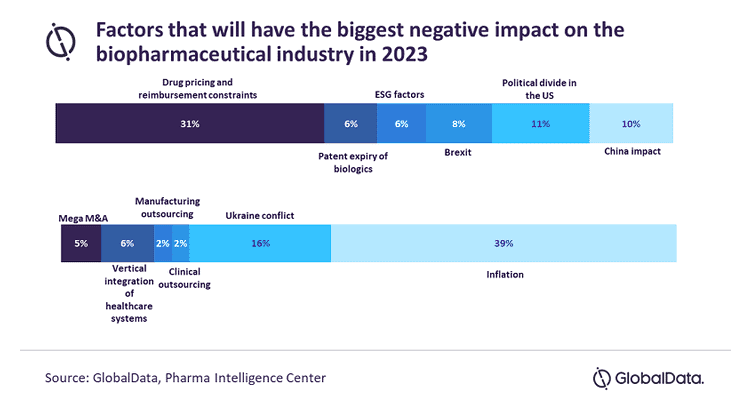Inflation, drug pricing and reimbursement constraints will have the biggest negative impact on biopharma industry in 2023: GlobalData
The survey as part of GlobalData's ‘State of the Biopharmaceutical Industry 2023’ report, found that close to 40 per cent of healthcare industry professionals viewed inflation as having the biggest negative impact on the biopharma industry in 2023, followed by pricing and reimbursement constraints (31 per cent)
Inflation, coupled with drug pricing and reimbursement constraints, will put high pressure on biopharma industry’s growth prospects in 2023, a survey by GlobalData has found.
The survey as part of GlobalData’s ‘State of the Biopharmaceutical Industry 2023’ report, found that close to 40 per cent of healthcare industry professionals viewed inflation as having the biggest negative impact on the biopharma industry in 2023, followed by pricing and reimbursement constraints (31 per cent), as per a statement from GlobalData.
The statement also said that the biopharma industry will be impacted by a number of regulatory and macro-economic factors in 2023. These include rising costs, geo-political uncertainties, patent expirations, increasing demands to become more sustainable, and drug pricing pressures from cost-conscious regulators.
Urte Jakimaviciute, Senior Director, Market Research, GlobalData, said in the statement, “While pricing and reimbursement constraints was scored as the most negative trend by the surveyed biopharmaceutical industry professionals between 2019–2022, inflation is predicted to bring the biggest negative impact to the sector in 2023. Inflationary pressures on labour, cost of raw materials, active ingredients and intermediates will continue to bite into the net drug prices and the industry will need to find ways to offset this.”
Even though COVID-19 vaccines allowed economies and societies to safely reopen, inflation will challenge ongoing post-COVID-19 recovery. For the pharma industry, it means balancing between optimising operational spend, reducing Research and Development (R&D) costs, and increasing drug prices, all while simultaneously navigating new regulations on drug pricing, the statement added.
Jakimaviciute concluded in the statement, “To sustain growth, the pharmaceutical industry will need to continue to innovate. This may include modernising R&D models, addressing Environmental, Social and Governance (ESG) issues, leveraging emerging technologies and encouraging cross-functional or cross-company collaborations that may eventually help to move it towards this goal.”
Further, according to the statement, 198 healthcare industry professionals were surveyed between 26th October, 2022 to 23rd November, 2022.



website is featured